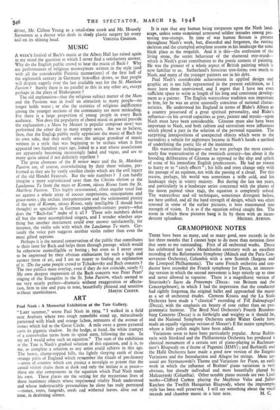MUSIC A WEEK'S festival of Bach's music at the Albert
Hall has raised again in my mind the question to which I never find a satisfactory answer. Why do the English public crowd to hear the music of Bach ? Why are performances of religious masterpieces written in the style (and with all the considerable Pietistic mannerisms) of the first half of the eighteenth century in Germany box-office draws, so that people will dispute eagerly over the last available seat for the St. Matthew Passion ? Surely there is no parallel to this in any other art, except perhaps in the plays of Shakespeare ?
The old explanation—that the religious subject matter of the Mass and the Passions was in itself an attraction to many people—no longer holds water ; or else the statistics of religious indifference among the younger sections of the community are most misleading. For there is a large proportion of young people in every Bach audience. Nor does the popularity of choral music in general provide the explanation ; a Mass by Mozart (a popular composer now) was performed the other day to many empty seats. Are we to believe, then, that the English public really appreciate the music of Bach for its own sake, that they really sense .the unique grandeur of music written in a style that was beginning to be archaic when it first appeared two hundred years ago, linked to a text whose associations are apparently becoming increasingly faded and vague, and are to many quite unreal if not definitely repellent ?
The great choruses of the B minor mass and the St. Matthew Passion are, of course, overwhelming by their sheer volume, per- formed as they are by vastly swollen choirs which are the evil legacy of the old Handel Festivals. But the solo numbers ? I can hardly imagine a more sophisticated taste than the Christe eleison or the Laudamus Te from the mass or Komm, susses Kreuz from the St. Matthew Passion. This highly ornamented, often angular vocal line set against a whole array of rococo suspensions, syncopations and grace-notes • the archaic instrumentation and the sentimental piosity of the text Cif Komm, susses Kreuz, only intelligible (I should have thought) to specialists in German eighteenth-century poetry—what does the " Bach-fan " .make of it all ? These solo numbers defeat all but the most accomplished singers, and I wonder whether any- thing but another instrument could ever answer satisfactorily, for instance, the violin solo with which the Laudamus Te starts. Cer- tainly the voice part suggests another violin rather than even the most gifted soprano.
Perhaps it is the natural conservatism of the public that contributes to their taste for Bach and helps them through passage, which would be, otherwise unintelligible or boring; even so I never cease to be impressed by their obvious entusiasm for such a high and austere form of art, and I am no nearer to finding an explanation of it. (Do the same people crowd to Tchaikovsky and Bach concerts ? The two pubrics must overlap, even if they do not coincide, surely ?) My own deepest impression of the Bach concerts was Peter Pears' singing of the Evangelist in the St. John Passion, which seemed to me very nearly perfect—dramatic without exaggeration or affecta- tion, firm in line and pure in tone, beautifully phrased and sensitive






























 Previous page
Previous page